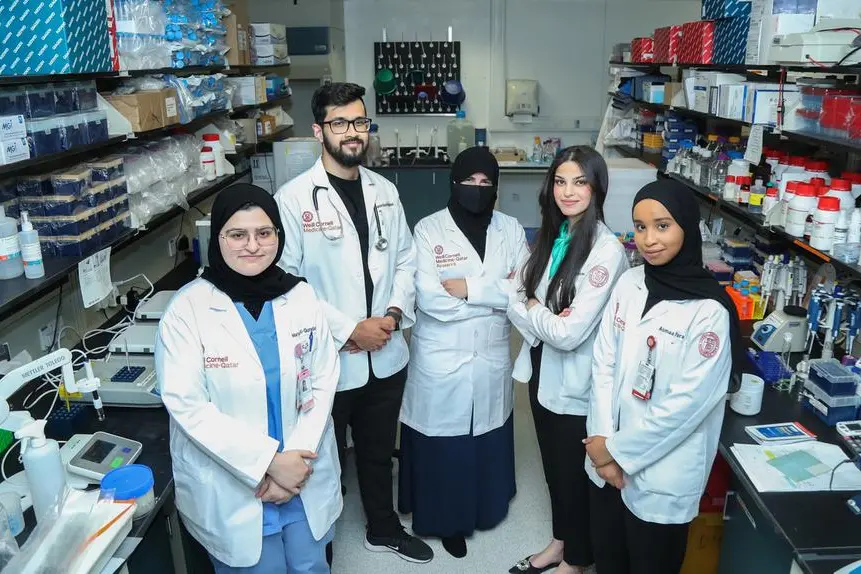PHOTO
Doha: Senior researchers and medical students at Weill Cornell Medicine-Qatar (WCM-Q) have published a paper focused on improving drug-screening platforms for vascular diseases.
The research team, led by Dr. Isra Marei, Post-Doctoral Associate in Pharmacology, includes four members of WCM-Q’s Class of 2024 - Tala Abu Samaan, Maryam Ali Al-Quradaghi, Asmaa A Farah and Shamin Hayat Mahmud – plus Professor Chris Triggle, Professor of Pharmacology, and Associate Professor of Pharmacology Hong Ding.
The study has been published in Frontiers in Cardiovascular Medicine as an invited review for a special issue on regenerative medicine and is titled, ‘3D tissue-engineered vascular drug screening platforms: promise and considerations.’
The paper focused on improving drug screening platforms for vascular diseases. Drug screening is an important step towards drug discovery; however, drugs pass through several screening and validation steps before they are approved for clinical use. This process takes at least 10 years between pre-clinical in vitro testing and clinical studies. Despite many drugs showing great promise in the pre-clinical phase, only 10 percent of the drugs that enter phase 1 clinical trials are expected to advance to the point they receive approval by the US Food and Drug Administration (FDA).
Dr. Marei, first author of the paper, said: “The high failure rate of many drugs in development could be attributed in part to the limitations of the currently used pre-clinical 2D models, which do not accurately reflect human physiological responses. Thus, there is a need to mimic the human physiological conditions in pre-clinical studies to improve drug screening platforms. A novel approach is to use patients’ stem cells to develop 3D tissue-engineered constructs in vitro. Such platforms will also offer the potential for personalized drug testing to accommodate patients’ specific needs. We feel there is a great deal of potential in this line of study for making drug screening more effective, and this really captured the imagination of the students, who made excellent contributions to this work.”
Personalization using 3D systems might eventually provide a predictive and relatively cost-effective method to screen out unsuccessful drug developments and reduce the need for clinical trials. The paper discussed the promise of these systems, and the factors that should be considered to produce a successful 3D vessel that is both reliable and reproducible.
The background to the manuscript stems from an Undergraduate Research Experience Program (UREP) grant (UREP25-042-3-011) funded by the Qatar National Research Fund (QNRF) with the title: ‘Towards the Development of an Endothelial Progenitor Cell - Based Vascular Graft for Drug Screening’ and also an Advanced Biomedical Sciences Research Requirement (ABSR) project awarded to Maryam Ali Al-Quradaghi. Due to laboratory access restrictions in place in 2020, Dr. Marei organized regular virtual meetings during the first phase of the UREP project and this resulted in the drafting of the manuscript that was finally submitted in late 2021. The significance of the work was also recognized and supported the by L’Oréal-UNESCO For Women in Science Young Talents Program Middle East, awarded to Dr. Marei in 2020.
Dr. Marei applauded the contribution of the students to the study, saying that each had put their “heart and soul” into continuing the project in difficult circumstances, with much of the work being conducted on virtual platforms during lockdown.
Student Tala Abu Samaan said: “Medicine is a limitless, ever-growing field. Throughout my participation in this project, I asked more questions than we had answers to and this only attests to the promise this technology holds. Culturing 3D blood vessels will not only revolutionize drug screening, but it also holds the potential of changing the future of cardiovascular diseases. 3D tissue-engineering is a fertile ground for many future medical uses.”
Fellow student Maryam Al-Quradaghi said: “My involvement in this UREP project allowed me to understand the basics of scientific research in a more comprehensive way. Understanding these fundamentals is extremely important for my future as a medical doctor where understanding literature and research is key to being up to date with the latest advances.”
In addition to publishing the paper, the team also presented the experimental aspect of their project during a conference hosted by the Nature group of scientific journals. The conference, titled #NatconfTissue21: Innovative tissue therapies from bench to bedside, was hosted virtually in November 2021.
Read the paper in full here: https://doi.org/10.3389/fcvm.2022.847554
-Ends-
About Weill Cornell Medicine - Qatar
Weill Cornell Medicine - Qatar is a partnership between Cornell University and Qatar Foundation. It offers a comprehensive six-year medical program leading to the Cornell University M.D. degree with teaching by Cornell and Weill Cornell faculty and by physicians at Hamad Medical Corporation (HMC), Aspetar Orthopedic and Sports Medicine Hospital, the Primary Health Care Corporation, the Feto Maternal Center, and Sidra Medicine, who hold Weill Cornell appointments. Through its biomedical research program, WCM-Q is building a sustainable research community in Qatar while advancing basic science and clinical research. Through its medical college, WCM-Q seeks to provide the finest education possible for medical students, to improve health care both now and for future generations, and to provide high quality health care to the Qatari population.
For more info, please contact:
Hanan Lakkis
Associate Director, Media and Publications
Weill Cornell Medicine - Qatar
hyl2004@qatar-med.cornell.edu




















